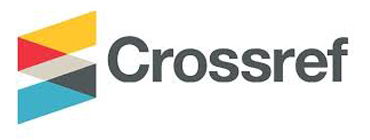STUDENTS’ PERSPECTIVE ON HYBRID LEARNING AFTER THE COVID-19 BREAK : A LEARNING REFLECTION THROUGH PHOTOVOICE
Abstract
Full Text:
PDFReferences
Abunamous, M. O., Boudouaia, A., Jebril, M., Diafi, S., & Zreik, M. (2022). The decay of traditional education: A case study under covid-19. Cogent Education, 9 (1), 2082116, https://doi.org/10.1080/2331186X.2022.2082116
Allen, E., & Seaman, J. (2013). Changing course: Ten years of tracking online education in the United States. Babson Park, MA: Babson Survey Research Group and Quahog Research Group. https:// files.eric.ed.gov/fulltext/ED541571.pdf
Alnajdi, S. M. (2014). Hybrid learning in higher education. Retrieved from https://www.researchgate.net/publication/318361485
Bond, M., Marín, V. I., Dolch, C., Bedenlier, S., & Zawacki-Richter, O. (2018). Digital transformation in German higher education: Student and teacher perceptions and usage of digital media. International Journal of Educational Technology in Higher Education, 15(1), 48. https://doi.org/10.1186/s41239-018-0130-1
Elshami, W., Taha, M. H., Abuzaid, M., Saravanan, C., Al Kawas, S., & Abdalla, M. E. (2021) Satisfaction with online learning in the new normal: Perspective of students and faculty at medical and health sciences colleges. Medical Education Online, 26 (1), 1920090. https://doi.org/10.1080/10872981.2021.1920090
Fishman B, Konstantopoulos S, Kubitskey BW. (2013). Comparing the impact of online and face-to-face professional development in the context of curriculum implementation. Journal of Teacher Education, 64(5):426–438.
Halverson, L. R., Graham, C. R., Spring, K. J., & Drysdale, J. S. (2012). An analysis of high impact scholarship and publication trends in blended learning. Distance Education, 33(3), 381-413.
Hiltz, S. R., & Turoff, M. (2005). Education goes digital: The evolution of online learning and the revolution in higher education. Communications of the ACM, 48(10), 59–64. https://doi.org/10.1145/1089107.1089139
Jefferies, A., & Hyde, R. (2010). Building the future student’s blended learning experience from current research findings. Electronic Journal of e- Learning, 8(2), 133–140.
Johnson, E., Morwane, R., Dada, S., Pretorius, G., & Lotriet, M. (2018) Adult Learners' perspectives on their engagement in a hybrid learning postgraduate programme. The Journal of Continuing Higher Education, 66 (2), 88-105, https://doi.org/10.1080/07377363.2018.1469071
Kitayama, S., & Park, J. (2020). Is conscientiousness always associated with better health? A U.S.-Japan cross-cultural examination of biological health risk. Personality & Social Psychology Bulletin. Advance online publication. https://doi.org/10.1177/0146167220929824
Kopp, M., Gröblinger, O., & Adams, S. (2019, March 11–13). Five common assumptions that prevent digital transformation at higher education institutions. INTED2019 Proceedings, 1448–1457. https://doi.org/10.21125/inted.2019
Leszczyński, P., Charuta, A., Łaziuk, B., Gałązkowski, R., Wejnarski, A., Roszak, M., & Kołodziejczak, B. (2018). Multimedia and interactivity in distance learning of resuscitation guidelines: A randomised controlled trial. Interactive Learning Environments, 26(2), 151–162. https://doi.org/10.1080/10494820.2017.1337035
McIntyre, A. (2008). Participatory Action Research. Los Angeles, CA: SAGE.
Nguyen, N. T. (2011). Transactions of Computational Collective Intelligence IV. New York: Springer Press.
Pittaway, S. M., & Moss, T. (2014). Initially, we were just names on a computer screen: Designing engagement in online teacher education. Australian Journal of Teacher Education, 39(7), 8.
Qi, L., & Tian, A. (2011). Design and application of hybrid learning platform based on joomla. In M. Zhou, & H. Tan (Eds.), Advances in Computer Science and Education Applications (pp. 549-556).
Ribeiro, R. (2020, April 14). How university faculty embraced the remote learning shift. EdTech Magazine. https://edtechmagazine.com/higher/article/2020/04/how-university-faculty-embraced-remote-learning-shift
Rienties B, & Toetenel L. (2016). The impact of learning design on student behaviour, satisfaction and performance: a cross-institutional comparison across 151 modules. Comput Human Behav, 60: 333–341.
Sandkuhl, K., & Lehmann, H. (2017). Digital transformation in higher education – the role of enterprise architectures and portals. Digital Enterprise Computing (DEC 2017).
Strielkowski, W. (2020). COVID-19 pandemic and the digital revolution in academia and higher education. Preprints, 2020040290. http://doi.org/10.20944/preprints202004.0290.v1
Suresh, A., Wighton, A. N., Sorensen, T. E., Palladino, T. C., Pinto-Powell, R. C. (2022). A hybrid educational approach to service learning: impact on student attitudes and readiness in working with medically underserved communities. Medical Education Online, 27 (1), 2122106. http://doi.org/10.1080/10872981.2022.2122106
Tashiro, A., & Shaw, R. (2020). COVID-19 pandemic response in Japan: What is behind the initial flattering of the curve? Sustainability, 12(13), 5250. https://doi.org/10.3390/su12135250
Sullivan, T. M., & Freishtat, R. (2013). Extending Learning Beyond the Classroom: Graduate Student Experiences of Online Discussions in a Hybrid Course. The Journal of Continuing Higher Education, 61 (1), 12-22. http://doi.org/10.1080/07377363.2013.758555
Xie, X., Siau, K., & Nah, F. F. (2020). COVID-19 pandemic – online education in the new normal and the next normal. Journal of Information Technology Case and Application Research, 22 (3), 175-187. http://doi.org/10.1080/15228053.2020.1824884
DOI: http://dx.doi.org/10.30829/tar.v29i2.1876
Refbacks
- There are currently no refbacks.

Jurnal Tarbiyah by UIN Sumatera Utara Medan is licensed under a Creative Commons Attribution-NonCommercial-ShareAlike 4.0 International License.
Based on a work at http://jurnaltarbiyah.uinsu.ac.id/index.php/tarbiyah.
Permissions beyond the scope of this license may be available at http://jurnaltarbiyah.uinsu.ac.id/index.php/tarbiyah/about/submissions#copyrightNotice.
















